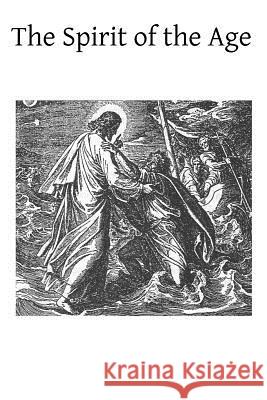The Spirit of the Age: or Faith and Infidelity » książka
The Spirit of the Age: or Faith and Infidelity
ISBN-13: 9781517386665 / Angielski / Miękka / 2015 / 186 str.
How many we hear speaking about the spirit of the age, and, yet, how few are prepared to define that creature of the mind, to tell exactly in what it consists, whence it springs, what role it plays in the great drama of existence or what influences it posessess When we speak of the age, we doubtlessly refer to the century in which we live-consequently from the expression the spirit of the age we naturally infer that each successive period in the history of the world has had its particular spirit, different from that which held sway in preceding or succeeding epochs, and that our age has also a spirit peculiar to itself. Without going any further we will ask ourselves two questions and then strive, as best we can, to answer them correctly. Firstly what is the spirit of the age? And secondly what is the spirit of OUR age? The spirit of the age is that certain motive power which governs the actions of men, holds a predominating influence over moral lives and ways, either for good or evil, their social relations, whether as between individuals or between peoples. I t originates in the continual changes to which the human family is prone and in the ever fluctuating circumstances, . different in each age, that surround and throng the avenues of life. It is either good or evil, according to the accident of the alternate ascendency of virtue or vice in the bosom of humanity. It pervades every social system, breathing its influence, beneficial or baneful, upon the world and bending at will and directing the actions of men. It is that which shapes for man, as an individual and for a nation, as the aggregate of individuals, their different courses at divers epochs. Its object must seemingly be the happiness of the human race-yet, when springing from an impure source and nurtured in frivolty or crime, although it apparently tends towards the greater happiness, it really leads the way and clears the path to destruction, sorrow, sin and death It changes with the ideas of men. It is influenced by education as well as by ignorance; it is moulded after the fashions, the vices, the habits or the virtues of the hour. Its cradle may be the rising splendors of a new civilization or the mouldering ruins of a perishing barbarism its tomb, also, may be the vortex of thoughtless vanities, or the sombre shades of ruined cloisters. I t is a vitality, not a living- being-. Words cannot define it exactly, the mind alone can conceive it. Suffice to say that it governs our lives and our actions and directs our ainls to good or evil as the case may be
Zawartość książki może nie spełniać oczekiwań – reklamacje nie obejmują treści, która mogła nie być redakcyjnie ani merytorycznie opracowana.











